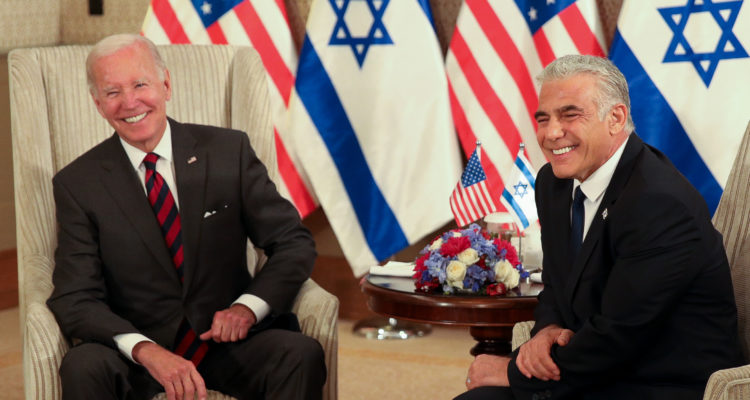The date being discussed is Sept. 20, during the 77th session of the General Assembly of the United Nations.
By JNS
The teams of Israeli Prime Minister Yair Lapid and U.S. President Joe Biden are working to arrange a meeting between the two next month, Channel 11 reported on Saturday.
The date being discussed is Sept. 20 during the 77th session of the General Assembly of the United Nations, which opens on Sept. 13.
The White House refused an initial request from Lapid to speak with Biden, it was reported last week.
The proposed meeting comes against the background of renewed momentum to revive the 2015 nuclear deal as the United States last Wednesday responded to Iran’s latest offer.
Israeli Defense Minister Benny Gantz met on Saturday with the heads of leading think tanks in Washington, D.C., to warn of the dangers of restarting the deal, Channel 11 reported.
“The knowledge and capabilities that Iran has gained require improvements in the nuclear agreement under discussion, including the need to postpone the end date of the restrictions,” Gantz told the institutes, referring to “sunset clauses” that terminate limitations on Iran’s nuclear program after fixed dates.
Lapid also has spoken out against the agreement, telling a group of foreign correspondents on Aug. 24 that the deal would enrich Iran to the tune of $100 billion dollars a year.
However, during a briefing on Aug. 25 Israel’s prime minister also reportedly told Mossad director David Barnea to tone down attacks on the United States when criticizing the deal, Israeli media reported.
“The Prime Minister was surprised by the content of the words and asked Barnea to stay with the government’s official line, so that all the parties expressing themselves on the subject of the nuclear agreement will speak with one voice,” Ynet reported.
Barnea has said in briefings that the likelihood of an agreement being concluded is 100%, describing it as a “strategic disaster.” The deal will only push back Iran’s quest for a bomb by a few months while providing it with billions of dollars, which it will use to fund its terrorist proxies throughout the region, including in Lebanon, the Gaza Strip and Yemen, according to Barnea.
Other actors in the region will look to Iran as a “model” for imitation further complicating Israel’s position, he added.





